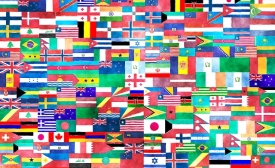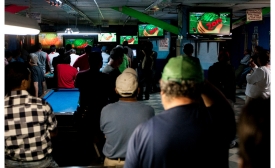nation branding
Everyone knew it would be difficult for Brazil without the injured star Neymar and the suspended captain, Thiago Silva, but nobody imagined this feeble capitulation — four goals surrendered to Germany in six minutes during a 7-1 rout in a World Cup semifinal. Early on, Brazil’s players bickered, lost their cool, then lost their fight. The country of the beautiful game was left to face a grotesque humiliation.
When huge protests rocked Brazilian cities a year ago, Raphael Rabelo was among the multitudes in the streets, even joining the thousands of demonstrators enraged with political corruption and spending on lavish World Cup stadiums who danced on the roof of the Congress building in Brasília. But in a U-turn reflecting shifting attitudes in Brazil about the soccer tournament now that it is underway, Mr.

Simon Anholt has recently established a new method to evaluate a country's reputation and image. The Good Country Index measures "what each country on earth contributes to the common good of humanity, and what it takes away." Various factors are considered in the evaluation including: science and technology, culture, international peace and security, world order, planet and climate, prosperity and equality, and health and wellbeing.
This global tourism campaign aims to brand the United States as the "Land of Dreams" for travelers
Assessing the success of Brazil’s hosting of the World Cup 2014 and Olympic Games 2016 will pivot on more than positive net income metrics and avoiding a stadium infrastructure legacy of white elephants. The aspiration of hosting mega-sport events such as the World Cup is often justified in terms of nation branding. In the case of Brazil, successful nation branding will mean that by hosting a World Cup, Brazil will create and generate certain – hopefully favorable – national images.

How Brazil is using the World Cup to achieve nation branding and diplomatic objectives.
The Nigerian government has signed a contract worth more than $1.2 million with a Washington DC public relations firm to deal with the fallout from the Boko Haram kidnappings. In a report in The Hill, documents show that the Nigerian president, Goodluck Jonathan, who is up for re-election in February, is seeking to counter the perception that he has not done enough to combat the Islamic extremists in his country who abducted more than 270 schoolgirls in Chibok in April.
A new brand campaign from Tahiti Tourisme seeks to establish a deeper mystique lying beneath the surface of the “picture postcard” beauty of the destination. With the rise of competition in the Pacific from such island destinations as Fiji and the Cooks, Tahiti Tourisme saw a need to create more differentiation. The branding is global and not specific to any particular market.







